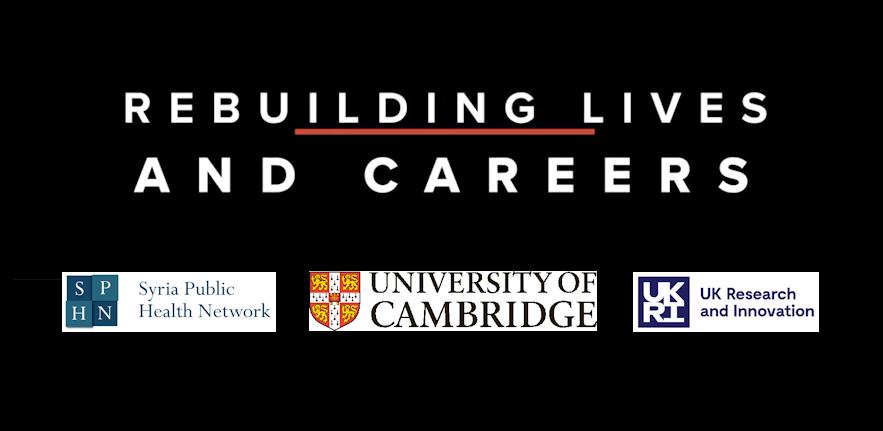
Submitted by Di Kennedy on Fri, 04/09/2020 - 13:22
In this project we bring together new partners from academia, policy, politics and those working on-the-ground to build a network that seeks to address the policy and political challenges that prevent the integration and employment of displaced Syrian healthcare workers (HCWs) into labour markets in the Middle East, Europe and the United Kingdom.
In this film we present the experiences of three Syrian healthcare workers who have arrived in Turkey, Germany and the UK. These countries represent the spectrum of policy approaches, political and legislative systems in which Syrian HCWs attempt to offer their much-needed experience and high-quality skills.
Project lead Dr Adam Coutts from the University of Cambridge says ‘employing displaced Syrian healthcare workers is a ‘win-win’ for both host communities and refugees in terms helping to strengthen the NHS and fill service gaps exposed by the Covid-19 crisis. Employing these healthcare workers helps them move out of poverty and get on with their lives rather than just getting by. They have already been through enough trauma in escaping a war zone. In the policy to build, build, build it is a great waste to not use their skills!’
Dr Aula Abbara co founder of the Syria Public Health Network adds ’ much more investment and policy attention needs to be given for services like the Lincolnshire Refugee Doctors Programme who provide an essential service which supports refugee doctors and speeds up the process of recertification and recruitment. In the aftermath of the Covid-19 crisis the NHS is in desperate need of their knowledge and skills’
Why employ displaced Syrian healthcare workers?
For healthcare workers (HCWs), Syria has become the most dangerous country in the world to practice. After nine years of conflict, the health of Syrians, their health system and its workforce have been destroyed. The rapid outbreak of Covid19 across Syria is set to add further misery. Thousands of qualified health professionals in Syria have left the country since 2011 due to military attacks on clinics and hospitals. These essential workers now find themselves excluded from formal job opportunities and sliding into poverty in host communities in the Middle East and Europe.
Syrian HCWs as with many other displaced HCW professionals are a well-educated and highly skilled workforce. Their experiences have important policy, economic, humanitarian and academic implications. The ongoing exodus of highly skilled workers from Syria, Iraq and North Africa – characteristic of protracted crises in middle-income, largely urban settings – affects the ability of aid organisations and governments to deliver humanitarian assistance to people. Available evidence on post-conflict reconstruction shows that rebuilding the health workforce is one of the top priorities for action to ensure strengthened healthcare provision for citizens in both the short and long term.
The World Health Organization has recently called for large scale investment in the health workforce to achieve the health Sustainable Development Goals. Approximately eighty percent of the investment required to achieve universal health coverage by 2030 is needed for the education and employment of health personnel. The WHO estimates a shortfall of 18 million health workers to accelerate universal health coverage by 2030, particularly in low to middle income countries.
Displaced healthcare professionals present major economic and social opportunities for host communities in the Middle East and the economies of Europe. Specifically, they will help to:
- strengthen the underfunded and overwhelmed health and social welfare systems in the Middle East, Europe and the United Kingdom,
- help countries move toward achieving universal healthcare (UHC) and above all increasing economic productivity,
- reduce the burden of protracted crises on host community public services in humanitarian settings such as Lebanon.
This research and film is funded by the Global Challenges Research Fund, UK Research Innovation
TWITTER: #refugeehealthworkers #supportsyrianHCWs #Jobs4SyriaHCW
MEDIA CONTACTS
| Project Website: https://r4hc-mena.org/ @r4hcmena |
|
Dr Adam P. Coutts Department of Sociology, University of Cambridge apc31@cam.ac.uk Tel: +44 7794 505 815 @adamcoutts |
|
Arabic/English: Dr Aula Abbara: Syria Public Health Network aula.abbara@gmail.com @SyriaHealth |
|
Professor Richard Sullivan, Director of the Centre for Conflict and Health, Kings College, London |
|
Lincolnshire Refugee Doctors Programme Media contact: Chairperson: Vince Ion: mail@vinceion.co.uk Tel: +44 03033 302 296 Website: https://www.lincsrefugeedoctors.co.uk/ @LincsRefugeeDoc |
